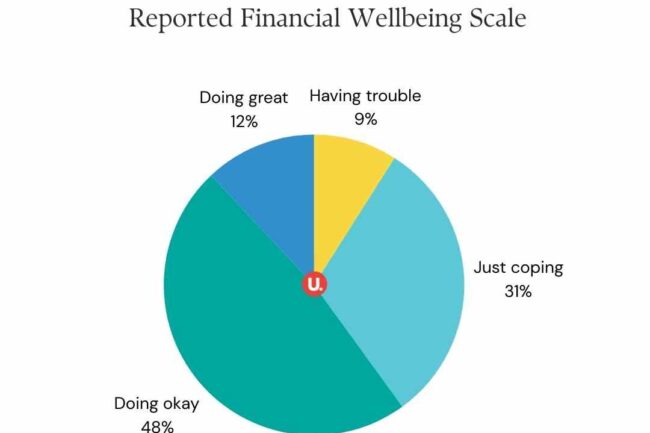Financial wellness is more than just having money in the bank—it’s about feeling secure and confident in your financial situation. Just as we prioritise our physical and mental health, our financial wellbeing plays a critical role in our overall quality of life. Yet, for many Australians, financial stress is a daily reality.
According to recent statistics:
- 2.4 million Australians suffer from financial stress.
- 37% of Australians say cost-of-living pressures are the biggest factor negatively affecting their mental health.
- 46% of Australians struggle to pay for regular expenses like rent and food before payday.
- Three in four Australians find it difficult to budget for expenses each month.
- 90% of Australians have an average of $4,331 in outstanding short-term debt.
- Up to 1.6 million Australians miss financial payments every month.
These numbers paint a clear picture: financial wellness is an issue that affects many people. The good news is that financial wellness is achievable with the right strategies, mindset, and support.
What Does Financial Wellness Look Like?
Achieving financial wellness means having control over your financial situation so that money is a source of security rather than stress. It includes:
- Managing financial stress – Maintaining a manageable level of worry about current and future finances.
- Controlling debt – Having little to no debt or ensuring debt can be repaid without significant financial strain.
- Maintaining a comfortable lifestyle – Having enough disposable income to afford a desirable and sustainable way of life.
- Building an emergency fund – Setting aside at least three months’ worth of living expenses for unexpected costs.
- Financial literacy and preparedness – Being equipped with the knowledge to plan for future financial goals and handle unforeseen financial challenges.
Steps to Achieve Financial Wellness
If financial stress is something you struggle with, you’re not alone—but you can take steps to improve your situation. Here’s how:
1. Start Budgeting and Tracking Expenses
One of the most effective ways to take control of your finances is by creating a budget. Yet, with three in four Australians struggling to budget each month, it’s clear that this is a challenge for many. A simple method like the 50/30/20 rule can help:
- 50% of your income goes towards necessities (rent, mortgage, bills, groceries).
- 30% goes to lifestyle choices (entertainment, dining out, hobbies).
- 20% is allocated to savings, investments, and debt repayment.
Using budgeting tools or apps can help make tracking expenses easier and provide a clear picture of where your money is going.
2. Reduce Debt and Avoid Costly Loans
With 90% of Australians carrying short-term debt, it’s important to manage and reduce debt strategically. Prioritise high-interest debts like credit cards and payday loans first, as these accumulate quickly. Consider consolidating debts into a lower-interest option or negotiating repayment plans with lenders to ease financial strain.
3. Build an Emergency Fund
Financial setbacks can happen unexpectedly—whether it’s a medical emergency, car repairs, or sudden job loss. A strong emergency fund should cover at least three months of essential expenses. Start small, even if it’s $20 a week, and increase contributions as your financial situation improves.
4. Seek Professional Guidance and Support
Many Australians don’t realise that financial wellness is within reach with the right guidance. At UFinancial, we offer a range of support services to help you regain control over your finances:
- Educational workshops to enhance financial literacy and provide practical tips.
- Complimentary financial assessments covering budgeting, debt management, investment analysis, and savings strategies.
- One-on-one financial planning sessions tailored to your personal goals.
- Regular market updates and economic insights to help you make informed decisions.
- Ongoing advice and support to track progress and adjust financial plans as needed.
5. Plan for the Future
Financial wellness isn’t just about handling the present—it’s about securing the future. This means setting long-term goals like homeownership, retirement savings, or investments. Understanding superannuation, diversifying income streams, and planning for major financial milestones can provide long-term financial security.
Take Control of Your Financial Wellbeing
Financial stress is a reality for millions of Australians, but it doesn’t have to be a permanent one. By taking proactive steps such as budgeting, reducing debt, building savings, and seeking professional guidance, you can create a more secure financial future.
If you’re ready to take the next step toward financial wellness, we’re here to help. Contact UFinancial today to schedule your complimentary financial assessment and take charge of your financial future
Disclaimer: The content of this article is general in nature and is presented for informative purposes. It is not intended to constitute tax or financial advice, whether general or personal nor is it intended to imply any recommendation or opinion about a financial product. It does not take into consideration your personal situation and may not be relevant to circumstances. Before taking any action, consider your own particular circumstances and seek professional advice. This content is protected by copyright laws and various other intellectual property laws. It is not to be modified, reproduced, or republished without prior written consent. Content developed in partnership with IFPA.
Subscribe to our newsletter to read about ‘All things finance’
At UFinancial, we love talking about finance-related matters. From home loans and refinancing to financial planning, investing, and tax.



